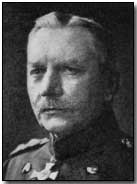Primary Documents - The Fall of Liege - A German Officer's Letter, August 1914
 Reproduced below is the
text of a letter written by a German officer in the aftermath of
the fall of
Liege in Belgium.
Reproduced below is the
text of a letter written by a German officer in the aftermath of
the fall of
Liege in Belgium.
The unnamed officer's letter dealt with the 'noble' and 'tragic' defence of Liege as led by Belgian General Gerard Leman.
Leman, who had both legs crushed during the defence of Liege, and who was finally carried from the fallen forts unconscious on a stretcher, subsequently wrote to King Albert I that he would rather have died than surrender the forts. (Click here to read Leman's prison diary from August 1914.)
In the aftermath of the fall, Leman attempted - as was custom - to hand over his ceremonial sword to the conquering German General von Emmich. The latter declined the offer, observing that it was an 'honour' to have fought against the valiant Leman.
The Fall of Liege - Letter from a German Officer, August 1914
General Leman's defence of Liege combined all that is noble, all that is tragic.
The commander of one fort (note: not Leman), at the moment when the bombardment was heaviest, went mad, and shot his own men. He was disarmed and bound. The cupola of another fort was destroyed by a bomb from a Zeppelin. Other forts were swept away like sand castles on the seashore before the relentless waves of the oncoming tide.
As long as possible General Leman inspected the forts daily to see that everything was in order. By a piece of falling masonry, dislodged by our guns, both General Leman's legs were crushed.
Undaunted, he visited the forts in an automobile. Fort Chaudfontein was destroyed by a German shell dropping in the magazine. In the strong Fort Loncin General Leman decided to hold his ground or die.
When the end was inevitable the Belgians disabled the last three guns and exploded the supply of shells kept by the guns in readiness. Before this, General Leman destroyed all plans, maps and papers relating to the defences. The food supplies were also destroyed.
With about 100 men, General Leman attempted to retire to another fort, but we had cut off their retreat. By this time our heaviest guns were in position, and a well-placed shell tore through the cracked and battered masonry and exploded in the main magazine. With a thunderous crash the mighty walls of the fort fell. Pieces of stone and concrete twenty-five cubic metres in size were hurled into the air.
When the dust and fumes passed away, we stormed the fort across ground literally strewn with the bodies of the troops who had gone out to storm the fort and never returned. All the men in the fort were wounded, and most were unconscious. A corporal with one arm shattered valiantly tried to drive us back by firing his rifle.
Buried in the debris and pinned beneath a massive beam was General Leman.
"Respectes le general, it est mort," said an aide-de-camp.
With gentleness and care, which showed they respected the man who had resisted them so valiantly and stubbornly, our infantry released the general's wounded form and carried him away. We thought him dead, but he recovered consciousness, and, looking around, said, "It is as it is. The men fought valiantly," and then, turning to us, added: "Put in your dispatches that I was unconscious."
We brought him to our commander, General von Emmich, and the two generals saluted. We tried to speak words of comfort, but he was silent - he is known as the silent general. "I was unconscious. Be sure and put that in your dispatches." More he would not say.
Extending his hand, our commander said: "General, you have gallantly and nobly held your forts." General Leman replied: "I thank you. Our troops have lived up to their reputations."
With a smile he added: "War is not like manoeuvres" - a reference to the fact that General von Emmich was recently with General Leman during the Belgian manoeuvres. Then, unbuckling his sword, General Leman tendered it to General von Emmich.
"No," replied the German commander, with a bow, "keep your sword. To have crossed swords with you has been an honour," and the fire in General Leman's eye was dimmed by a tear.
Source: Source Records of the Great War, Vol. II, ed. Charles F. Horne, National Alumni 1923
Duck-Boards comprised slatted wooden planking used for flooring trenches or muddy ground.
- Did you know?
